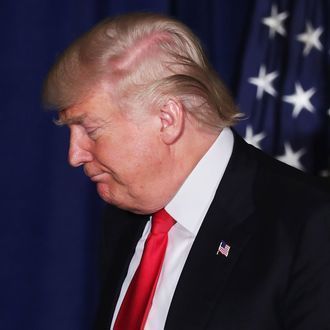
Donald Trump’s campaign is not a professionally run outfit. Over and over, journalists who have spoken with ex-staffers, (mostly anonymous) current ones, and experienced outside political strategists have noted that Trump has eschewed just about every presidential campaign must-do: hiring a robust staff of smart, experienced operatives to develop macro-level strategies; investing heavily in TV advertising; developing robust ground games in swing states; staying a step ahead of public-relations challenges, and so on.
The latest such dissection, this one from MSNBC’s Benjy Sarlin, Katy Tur, and Ali Vitali, paints a picture of a campaign in as much disarray as ever — one whose candidate appears not to have internalized the fact that he’s about to enter a bruising national election against a well-funded, well-organized opponent in Hillary Clinton.
The article is loaded with tasty red meat. There’s Hope Hicks, “who is essentially the lone media contact for reporters,” a 27-year-old with little political experience, hopelessly (sorry) doing the job of what in any other campaign would be a good-sized team (Clinton, of course, has a well-oiled comms operation consisting of “over a dozen senior staff,” led by Jennifer Palmieri, who has multiple presidential campaigns under her belt). There’s Hicks and campaign manager Corey Lewandowski actively preventing the hiring of desperately needed staffers who might “undermine their control” (undermining of their control is probably exactly what the campaign needs). There’s the roaring silence from the Trump camp after Clinton’s big recent foreign-policy address, despite the entire Republican establishment waiting for a rebuttal on an issue where Clinton is widely perceived as having some important potential weaknesses.
Most interesting, though, might be what the MSNBC authors have to say about Trump’s cringeworthy, racially charged attacks on Gonzalo Curiel, the judge overseeing a lawsuit against Trump University, which many graduates and consumer-protection advocates have accused of being little more than a scam designed to milk as much money as possible from vulnerable people.
Think about how a normal, competent campaign would handle such a serious-seeming threat. The top comms staffers would likely bunker somewhere for a while. They’d have multiple meetings. They’d work with the candidate him- or herself some, of course, but would also be empowered to autonomously harness their own public-relations expertise — they’d be trusted by the candidate, in other words. They’d run through every expected line of attack, every possible parry, and by the end of their strategizing they’d have a coherent message and line of counterattack: “What Mr. Smith’s opponent is saying is a gross, unfair misrepresentation, and here’s why …” They’d distribute those talking points to every staffer and surrogate who might speak to the press, and everyone would be on the same page. There’d be no mystery about how to respond.
Then there’s the Trump approach:
Aides appeared unprepared for the Trump University story last week, despite knowing in advance that unsealed court documents would reveal explosive allegations of fraud. Beyond a short video of former students praising the program that was posted online, the campaign offered scant pushback.
The absence of a response to the Trump U story left the candidate to fill the vacuum with a torrent of demagoguery against the federal judge overseeing the case … Trump’s comments against the judge horrified many supporters, but the real estate mogul rebuffed efforts by campaign staff, donors and party officials to back off the incendiary claim this weekend, per sources, telling them he was unwilling to look like he had caved to pressure.
“These are things that will defeat [us],” a second source within the campaign lamented.
The Curiel story made Trump’s already difficult task of lining up surrogates even harder, as supporters like former House Speaker Newt Gingrich, Tennessee Sen. Bob Corker and Senate Majority Leader Mitch McConnell distanced themselves from Trump’s remarks over the weekend.
What’s fascinating about this is the highly damaging way Trump’s personality deficits collided with his campaign’s shortcomings: Since there was no robust comms staff empowered to seize the reins and develop a counterattack strategy, that left only Trump to Trumprovise a response — in this case, ranting against a “Mexican” judge who was born in Indiana (and one who happens to have done rather heroic and courageous anti-drug-cartel work). Since Trump lacks powerful, trusted staffers whom he’ll listen to when they tell him he’s wrong, he has only ramped up the attacks on Curiel, even after it became clear they were the wrong approach.
Because Trump was able to wreck the impotent GOP field on the basis of his bombastically authoritarian personality, earned media coverage, and little else, he may have developed the illusion that only suckers pay for the accoutrements of traditional campaigning. He’s used to getting great deals, after all, and this is his chance to win the greatest deal of them all: to win a presidential election without a presidential campaign.
Whether Trump’s aides and supporters can break through this illusion will go a long way toward determining whether the 2016 election will be at all competitive.





























